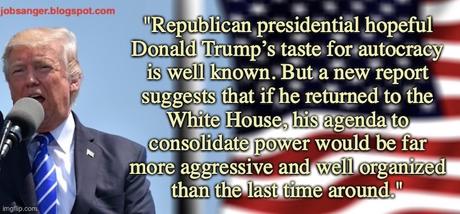
The following post is by Zeeshan Aleem at MSNBC.com:
Republican presidential hopeful Donald Trump’s taste for autocracy is well known. But a new report suggests that if he returned to the White House, his agenda to consolidate power would be far more aggressive and well organized than the last time around — thanks in part to even wider buy-in from the remains of the GOP establishment.
The New York Times published an article Monday that found that Trump and his allies are buzzing with ways he could use a radical interpretation of “unitary executive theory” to amass unprecedented power as president. That theory contends that the president holds total control of the executive branch, and it rejects constraints on presidential power such as Justice Department independence and congressional regulations on executive branch agencies.
There are several proposals that Trump, his campaign and allied think tanks have pushed to realize this vision. He intends to purge officials from the State Department, Defense Department and intelligence agencies that he thinks represent the “deep state” cabal. He’s spoken openly about ending the norm of an independent Justice Department, and instead using it to investigate political opponents. He would seek to bring agencies like the Federal Trade Commission directly under presidential control. He may try to “impound” funds — refusing to spend money allocated by Congress on policymaking he personally disfavors. (As the Times noted, Congress banned the practice during Richard Nixon’s administration.) And Trump would revive and strengthen rule changes to make it easier to fire members of the nonpartisan, expert-focused civil service perceived as disloyal.
Many of these measures would be met by fierce legal challenges. But the unmistakable goal is, as the Times put it, “to alter the balance of power by increasing the president’s authority over every part of the federal government that now operates, by either law or tradition, with any measure of independence from political interference by the White House.”
There are two particularly noteworthy takeaways from this report. One is that this level of planning suggests that a second Trump term could do a lot more damage than the first in degrading democracy. While Trump did in his first term reject norms constraining executive power, he underestimated how difficult it would be to reshape the government at his whim and was constantly confronted by a bureaucratic apparatus that pushed back against some of his boldest attempts to upend norms. Trump failed to put together a serious transition team, dramatically slowing his effectiveness when he entered office. Lawyers at the Department of Homeland Security pushed back against Trump’s first attempts at instituting a ban on Muslim immigration. When he wanted to install a new attorney general to assist him in his efforts to overturn the results of the 2020 election, Justice Department lawyers threatened mass resignations as a way to discourage him. When Trump called for shooting protesters, a member of the national security apparatus objected. Civil servants served as guardrails against some of Trump's most transgressive ideas.
Things could be different if Trump won another term. His team and his think tank allies are exerting a ton of effort to make the storming of the White House a lot more systematic, and thinking through using hiring and rule changes to create a more pliant set of officials and policymakers in the executive branch. One transition group, Project 2025, has a $22 million budget and already has drawn up personnel lists and transition plans, the Times reported. Trump and his inner circle will be more aware of the importance of swift strategic hiring and the points of friction with the bureaucracy that they felt held them back last time.
And while Trump was probably not held back by shame in his first term, he did back off of some of his more extreme measures when he felt the possibility of mass resignations made it politically difficult to pursue something. Now that he’s openly calling for the idea of purges and likely has even less regard for the political establishment, he could be more emboldened to act more rashly in the future.
The second noteworthy point is that this effort seems to have the potential to bleed well beyond Trump. Project 2025 isn’t designed only for Trump, but for any Republican who could win the White House. And it’s backed by the Heritage Foundation, an establishment right-wing think tank that has had tremendous influence over conservative politics since the Reagan era. In other words, the idea of leading an all-out assault on executive branch norms is something that, much like many of Trump’s ideas, could be seeping into the party more broadly. Theoretically, Trump’s competitors in the Republican presidential primary could object to dismantling an independent Justice Department or to other threats to democracy. But they seem eager to follow suit
Trump is far from the first president who has sought to increase the power of the presidency out of self-interest. Especially in the realm of national security, presidents from both parties have sought to expand their power in deeply alarming ways for decades. But Trump’s agenda seems poised to break new ground and attempt to streamline the government around the authority of one person. Even if he faces fights in the courts on many of his measures, the ambition and audacity of them are worrisome. Worst of all, his party appears to be on board with it.

